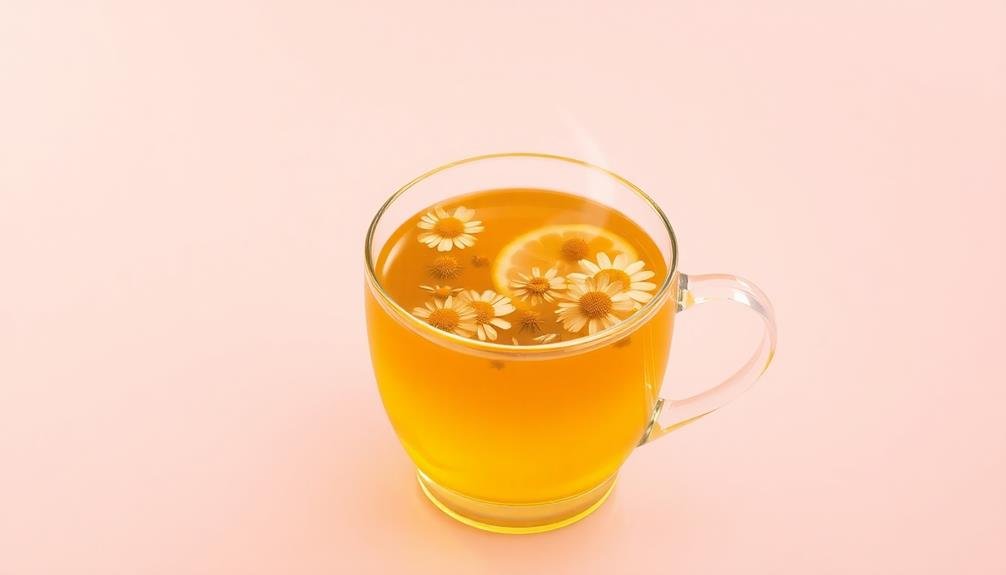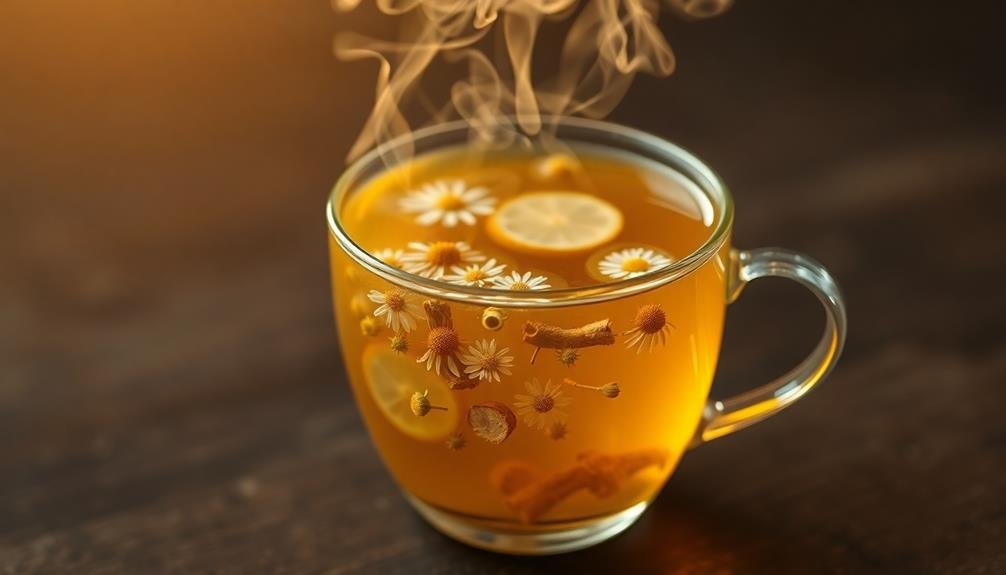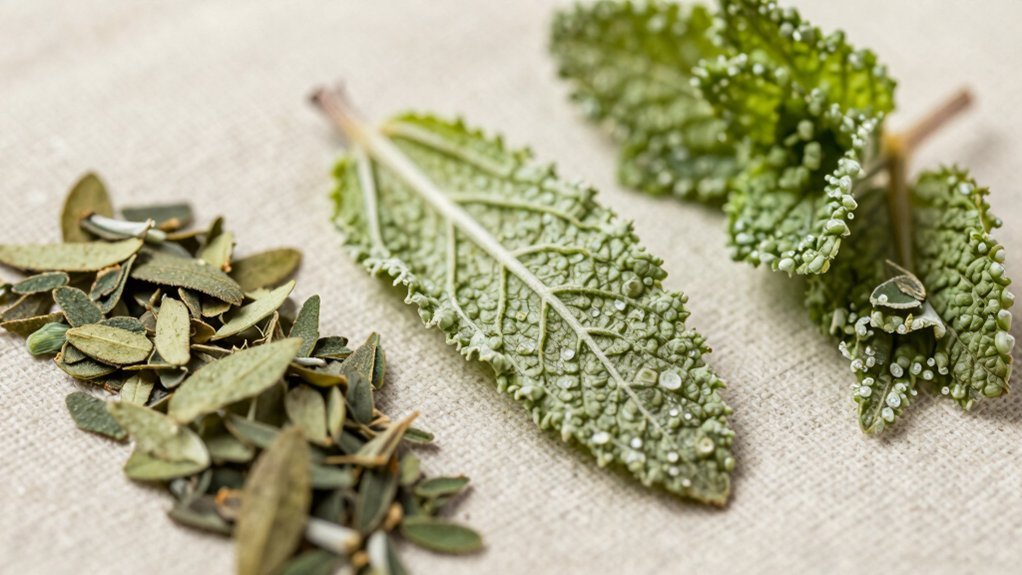Chamomile-ginger tea is a powerful digestive aid that combines the best of both herbs. Chamomile soothes your digestive tract, reduces inflammation, and eases cramps and bloating. Ginger promotes food movement, calms upset stomachs, and supports healthy gut bacteria. Together, they enhance anti-inflammatory properties, improve digestive enzyme activity, and may alleviate symptoms of conditions like IBS. This tea can stimulate the production of digestive juices, aiding in nutrient absorption and reducing bloating and gas. It's also great for stress-related digestive issues, thanks to chamomile's mild sedative effects. Discover how this dynamic duo can revolutionize your digestive health and overall well-being.
Benefits of Chamomile for Digestion

Tranquility in a cup, chamomile tea offers more than just a soothing flavor. It's a powerhouse for digestive health, providing relief for various gastrointestinal issues. When you sip chamomile tea, you're ingesting compounds that can ease stomach discomfort and promote better digestion.
Chamomile contains anti-inflammatory properties that help reduce irritation in your digestive tract. This can alleviate symptoms of conditions like irritable bowel syndrome (IBS) and acid reflux. The tea's antispasmodic effects relax the smooth muscles of your digestive system, potentially easing cramps and reducing bloating.
You'll also benefit from chamomile's ability to stimulate the production of digestive juices. This enhanced secretion aids in breaking down food more efficiently, leading to improved nutrient absorption.
Additionally, chamomile's mild sedative effects can help reduce stress-related digestive issues by calming your nervous system. Regular consumption of chamomile tea may even prevent the formation of ulcers by protecting your stomach lining.
Its antimicrobial properties can help maintain a healthy balance of gut bacteria, supporting overall digestive health. By incorporating chamomile tea into your routine, you're taking a natural approach to promoting better digestion and gut comfort.
Ginger's Digestive Properties
Spice up your digestive health with ginger, a potent root that's been used for centuries to soothe stomach woes. Ginger contains powerful compounds called gingerols and shogaols, which are responsible for its digestive benefits. These compounds stimulate the production of digestive juices and enzymes, helping to break down food more efficiently.
You'll find that ginger can reduce bloating and gas by promoting the movement of food through your digestive tract. It also has anti-inflammatory properties that can calm an upset stomach and relieve nausea. If you suffer from indigestion or heartburn, ginger may provide relief by reducing stomach acid production and protecting the lining of your esophagus.
Ginger's benefits extend beyond immediate relief. Regular consumption can improve overall gut health by promoting the growth of beneficial bacteria in your digestive system. It may also help manage chronic digestive issues like irritable bowel syndrome (IBS) by reducing inflammation and pain in the intestines.
When combined with chamomile in a tea, ginger's warming properties complement chamomile's soothing effects, creating a powerful duo for digestive wellness.
Synergistic Effects of Combined Ingredients

When you combine chamomile and ginger in a tea, you're getting more than just the sum of their individual benefits.
The mixture enhances anti-inflammatory properties, potentially offering greater relief from digestive discomfort.
Additionally, you'll experience improved digestive enzyme activity, which can help your body break down food more efficiently and absorb nutrients more effectively.
Enhanced Anti-Inflammatory Properties
By combining chamomile and ginger in a single tea, you're unearthing a powerful anti-inflammatory duo. These two ingredients work synergistically to amplify their individual anti-inflammatory effects. Chamomile contains apigenin, a flavonoid that inhibits inflammatory mediators, while ginger boasts gingerols and shogaols, compounds known for their potent anti-inflammatory properties.
When you drink chamomile-ginger tea, you're not just getting the sum of their parts, but a multiplied effect. The combination can help reduce inflammation in your digestive tract more effectively than either herb alone. This enhanced anti-inflammatory action may soothe irritated stomach linings, ease intestinal spasms, and potentially alleviate symptoms of conditions like irritable bowel syndrome or gastritis.
Moreover, the tea's anti-inflammatory benefits extend beyond your digestive system. It may help reduce systemic inflammation, which is linked to various chronic diseases.
Improved Digestive Enzyme Activity
The synergistic effects of chamomile and ginger extend beyond their anti-inflammatory properties to enhance digestive enzyme activity. When combined, these two potent herbs work together to stimulate the production and release of digestive enzymes, improving your body's ability to break down food and absorb nutrients.
Chamomile's compounds, particularly apigenin, help increase the production of bile, which aids in fat digestion. Meanwhile, ginger's active components, including gingerols and shogaols, stimulate the release of digestive juices and enzymes like lipase and amylase. This combination can greatly boost your digestive efficiency, reducing bloating, gas, and indigestion.
By drinking chamomile-ginger tea regularly, you'll experience:
- A soothing warmth that spreads through your digestive system
- A gentle, natural boost to your body's digestive processes
- Relief from uncomfortable bloating and fullness
- Improved nutrient absorption, helping you feel more energized
- A calming ritual that promotes overall digestive wellness
This powerful herbal duo not only supports your digestive health but also contributes to your overall well-being. By enhancing enzyme activity, chamomile-ginger tea helps your body process food more effectively, potentially reducing digestive discomfort and improving your gut health in the long run.
Brewing the Perfect Cup
Crafting the perfect cup of chamomile-ginger tea is both an art and a science. To maximize its digestive benefits, you'll want to pay attention to the details. Start with fresh, high-quality ingredients. Use organic chamomile flowers and fresh ginger root for the best flavor and potency.
Begin by boiling water and letting it cool slightly to around 200°F (93°C). This temperature helps extract the ideal amount of beneficial compounds without scalding the delicate chamomile. For each cup, use 1 teaspoon of dried chamomile flowers and a 1/2 inch slice of fresh ginger, peeled and grated.
Place the ingredients in a tea infuser or directly in your cup. Pour the hot water over them and steep for 5-7 minutes. The longer steeping time allows for better extraction of the ginger's active components. If you prefer a stronger flavor, you can increase the amount of ginger or steeping time.
Once brewed, remove the infuser or strain the tea. For added digestive benefits, you can stir in a teaspoon of raw honey. Sip your tea slowly, allowing its warmth and aroma to soothe your digestive system.
Best Time to Drink

Three key times stand out for drinking chamomile-ginger tea to support digestion.
First, consume a cup about 30 minutes before meals to prepare your digestive system. This helps stimulate the production of digestive enzymes and gastric juices, enhancing your body's ability to break down food.
Second, sip the tea immediately after meals to soothe your stomach and reduce bloating. The tea's natural compounds can help relax your digestive muscles and ease discomfort.
Finally, consider drinking a cup before bedtime to promote better sleep and overnight digestion.
For maximum benefit, you'll want to be consistent with your tea-drinking routine.
Here are some emotional benefits you might experience:
- Relief from nagging digestive discomfort
- A sense of calm and relaxation after meals
- Improved sleep quality and morning freshness
- Increased confidence in your digestive health
- A comforting ritual to look forward to daily
Potential Side Effects
While chamomile-ginger tea offers digestive benefits, you should be aware of potential side effects.
You may experience allergic reactions, especially if you're sensitive to plants in the daisy family.
It's important to consult your doctor about possible interactions with medications and concerns during pregnancy or breastfeeding.
Allergic Reactions
Recognizing potential allergic reactions is essential when considering chamomile-ginger tea for digestion. While rare, some individuals may experience allergic responses to either chamomile or ginger. If you're allergic to plants in the daisy family, such as ragweed or chrysanthemums, you might be more susceptible to chamomile allergies. Ginger allergies are less common but can still occur.
Watch for these signs of an allergic reaction:
- Itching or tingling in your mouth
- Swelling of the lips, tongue, or throat
- Difficulty breathing or wheezing
- Hives or skin rash
- Nausea or vomiting
If you experience any of these symptoms after consuming chamomile-ginger tea, stop drinking it immediately and seek medical attention.
It's always wise to start with a small amount when trying new herbal teas to test your body's response. If you have a history of allergies or are taking medications, consult your healthcare provider before incorporating chamomile-ginger tea into your routine.
Interactions With Medications
Medication interactions pose potential risks when consuming chamomile-ginger tea for digestion. You should be aware that both chamomile and ginger can interact with certain medications, potentially altering their effectiveness or causing adverse effects.
Chamomile may interact with blood thinners like warfarin, increasing the risk of bleeding. It can also enhance the effects of sedatives and anti-anxiety medications, leading to excessive drowsiness. If you're taking diabetes medications, chamomile might lower blood sugar levels further than intended.
Ginger can interact with blood thinners as well, potentially increasing bleeding risk. It may also interfere with medications for high blood pressure, potentially lowering it too much. If you're taking medications for diabetes, ginger might enhance their effects, leading to hypoglycemia.
Additionally, both chamomile and ginger can interact with certain antibiotics and antifungal medications, potentially reducing their effectiveness. If you're undergoing chemotherapy, these herbs might interfere with your treatment.
Before incorporating chamomile-ginger tea into your digestive health routine, consult your healthcare provider, especially if you're taking any medications. They can advise you on potential interactions and help you determine if this tea is safe for your specific situation.
Pregnancy and Breastfeeding Concerns
Expectant and nursing mothers should exercise caution when considering chamomile-ginger tea for digestive issues. While both chamomile and ginger are generally considered safe, there are potential risks to be aware of during pregnancy and breastfeeding.
Chamomile may stimulate uterine contractions, potentially increasing the risk of miscarriage or preterm labor. Ginger, although often recommended for morning sickness, should be consumed in moderation. High doses might affect fetal sex hormones or increase the risk of bleeding.
If you're pregnant or breastfeeding, always consult your healthcare provider before adding chamomile-ginger tea to your diet. They can provide personalized advice based on your specific health situation and any medications you're taking.
- Protect your growing baby from potential risks
- Make certain your breast milk remains safe and nourishing
- Avoid unnecessary complications during pregnancy
- Make informed decisions about your health and your baby's
- Feel confident in your choices as an expectant or new mother
Incorporating Into Daily Routine

Incorporating chamomile-ginger tea into your daily routine can be a simple yet effective way to support digestive health. You can enjoy this soothing beverage at various times throughout the day to maximize its benefits.
Consider these options for including chamomile-ginger tea in your schedule:
| Time of Day | Benefit |
|---|---|
| Morning | Gentle wake-up, aids breakfast digestion |
| Midday | Relieves stress, supports lunch digestion |
| Afternoon | Boosts energy, curbs cravings |
| Evening | Promotes relaxation, improves sleep quality |
To make the most of your tea routine, brew a fresh cup using high-quality ingredients. Steep one chamomile tea bag and a small piece of fresh ginger in hot water for 5-10 minutes. You can add honey or lemon for extra flavor and health benefits.
Remember to listen to your body and adjust your consumption as needed. If you're new to chamomile-ginger tea, start with one cup a day and gradually increase. By incorporating this tea into your daily routine, you'll support your digestive system and overall well-being.
Other Digestive-Friendly Tea Blends
While chamomile-ginger tea is an excellent choice for digestive health, it's not the only option available. You'll find several other tea blends that can soothe your stomach and promote better digestion.
Peppermint tea, for instance, is known for its ability to relax the digestive tract and reduce bloating. Fennel tea can help alleviate gas and cramping, while licorice root tea may soothe inflammation in the gut.
Don't overlook the power of green tea, which contains antioxidants that support overall digestive health. Dandelion root tea is another excellent option, as it can stimulate bile production and aid in the breakdown of fats.
When exploring these alternatives, remember that everyone's body reacts differently, so you might need to experiment to find the blend that works best for you.
Here are some reasons to try different digestive-friendly tea blends:
- Discover new flavors that delight your taste buds
- Tailor your tea choice to specific digestive issues
- Expand your knowledge of herbal remedies
- Create a diverse tea collection for various moods and needs
- Enjoy the ritual of trying new teas and their potential benefits
Frequently Asked Questions
Can Chamomile-Ginger Tea Help With Specific Digestive Disorders Like IBS?
You'll find chamomile-ginger tea can help with IBS symptoms. It's known to reduce inflammation, ease bloating, and soothe the digestive tract. While not a cure, it may provide relief for some people with IBS.
Is It Safe to Drink Chamomile-Ginger Tea During Pregnancy?
While chamomile-ginger tea is generally considered safe, you should consult your doctor before drinking it during pregnancy. It's best to limit your intake, as excessive amounts may cause complications. Always prioritize your health and follow medical advice.
How Does Chamomile-Ginger Tea Compare to Over-The-Counter Digestive Aids?
You'll find chamomile-ginger tea to be a natural alternative to OTC digestive aids. It's gentler on your system and doesn't have side effects. While it may work slower, it's often more soothing and can be consumed regularly.
Can Children Safely Consume Chamomile-Ginger Tea for Digestive Issues?
You can give children chamomile-ginger tea for digestive issues, but use caution. It's generally safe in small amounts, but consult your pediatrician first. Avoid giving it to infants or children with allergies to related plants.
Are There Any Known Drug Interactions With Chamomile-Ginger Tea?
You should be aware that chamomile-ginger tea can interact with certain medications. It may increase the effects of blood thinners, sedatives, and antiplatelet drugs. Always consult your doctor before consuming it if you're taking any medications.
In Summary
You've now learned about the powerful digestive benefits of chamomile-ginger tea. By incorporating this soothing blend into your daily routine, you'll support your gut health and potentially ease digestive discomfort. Remember to brew it properly and drink at the ideal time for best results. While it's generally safe, be aware of possible side effects. Don't hesitate to explore other digestive-friendly tea blends to find what works best for you.





Leave a Reply